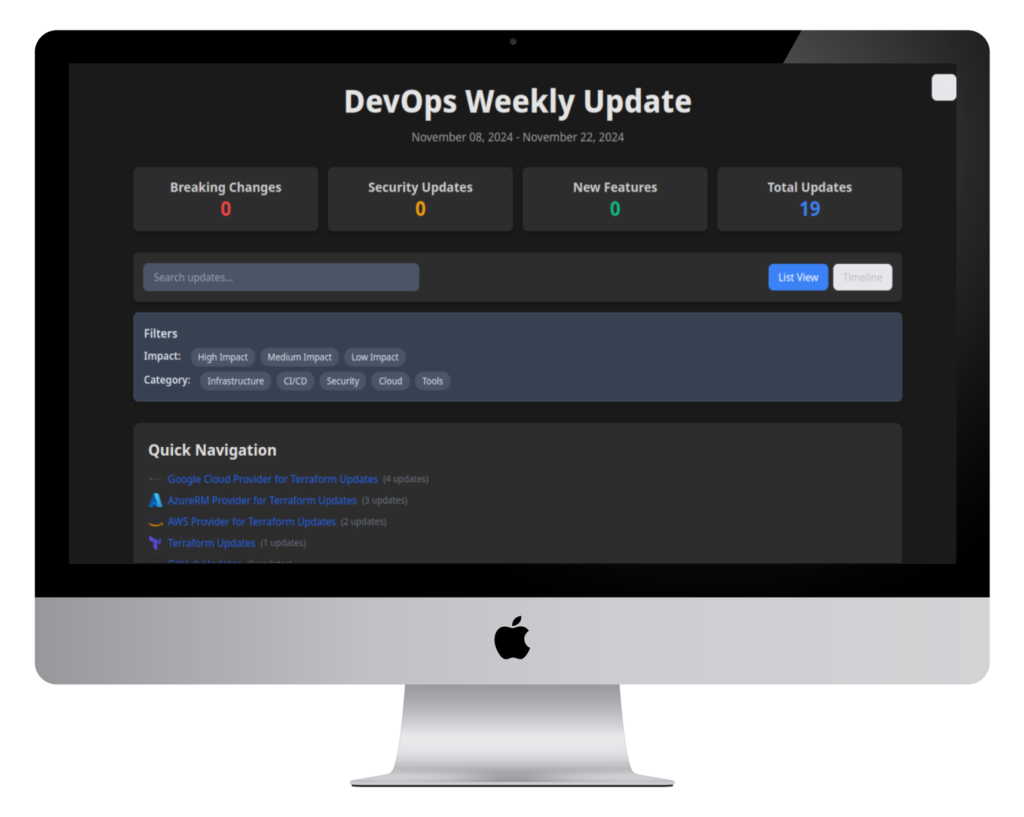As a DevOps engineer, staying up-to-date with the latest updates across various platforms and tools is crucial but time-consuming. To solve this challenge, I built an automated tool that aggregates updates from multiple DevOps platforms and uses AI to analyze and summarize the most important changes.
The public repository can be found here:
And the page can be found here:
Here’s how it works.
The Challenge
DevOps engineers need to track updates across:
- Cloud platforms (AWS, Azure, GCP)
- Version control systems (GitHub, GitLab)
- Infrastructure as Code tools (Terraform providers)
- AI/ML platforms (OpenAI, Anthropic)
- Various DevOps tools and services
Manually checking release notes, changelogs, and announcements across these platforms is inefficient and time-consuming. Important updates might be missed, and it’s difficult to assess the impact of changes quickly.
The Solution
I developed a Python-based tool that automatically collects updates from multiple sources, uses Claude AI to analyze and prioritize changes, generates a weekly digest in both HTML and RSS formats, categorizes updates by importance and type, and provides actionable insights for DevOps teams.
Technical Architecture
Data Collection Layer
The core aggregation is handled by a NewsAggregator class that manages date ranges for weekly updates, supports both RSS feeds and direct web scraping, and normalizes data from different sources into a consistent format.
class NewsAggregator:
def __init__(self, config):
self.config = config
self.current_week_range = self._get_week_range()
def aggregate(self):
entries = []
sources = self.config.get('sources', {})
for category, source_list in sources.items():
for source in source_list:
# Process RSS or manual sources
if source.get('manual', False):
entries.extend(fetch_manual_entries(source))
else:
entries.extend(fetch_rss_entries(source))AI Analysis Layer
The tool uses Claude AI to analyze each update through a sophisticated prompt engineering system. The analysis focuses on:
- Impact assessment (High/Medium/Low)
- Key changes and features
- Breaking changes
- Security updates
- Action items for DevOps teams
The analysis is source-aware, meaning it applies different analysis criteria based on the type of update:
def _create_source_specific_prompt(content, source, title, source_type):
if source_type == "terraform_providers":
# Focus on infrastructure impact
prompt_addition = """
Focus on:
1. Breaking changes in provider behavior
2. New resources or data sources
3. Bug fixes that might affect existing infrastructure
"""
elif source_type == "vcs_platforms":
# Focus on CI/CD implications
prompt_addition = """
Focus on:
1. New features for CI/CD pipelines
2. Security updates or requirements
3. API changes or deprecations
"""Output Generation
The tool generates two types of output:
1. An HTML digest with:
- Platform-specific sections
- Visual indicators for update importance
- Dark mode support
- Responsive design
2. An RSS feed for easy subscription
Automated Workflow
The entire process runs automatically through GitHub Actions:
- Runs weekly on Fridays
- Collects updates from the past week
- Processes them through Claude AI
- Generates and publishes the digest
- Updates the RSS feed
Key Features
Smart Categorization
Updates are automatically categorized based on content analysis:
- Breaking changes
- Security updates
- Performance improvements
- API changes
- New features
- Deprecations
Impact Assessment
Each update receives an impact level:
- HIGH: Requires immediate attention (breaking changes, security issues)
- MEDIUM: Important but not urgent (new features, deprecation notices)
- LOW: Informational updates
Actionable Insights
The AI analysis extracts specific action items for DevOps teams:
- Required version upgrades
- Configuration changes
- Security patches
- Migration steps
Results and Benefits
This tool has significantly improved our ability to:
- Stay current with DevOps platform updates
- Quickly assess the impact of changes
- Prioritize necessary actions
- Share important updates across the team
- Maintain a searchable archive of platform changes
Future Improvements
Planned enhancements include:
- Support for more data sources
- Enhanced AI analysis with GPT-4
- Custom notification rules
- Integration with ticketing systems
- Historical trend analysis




